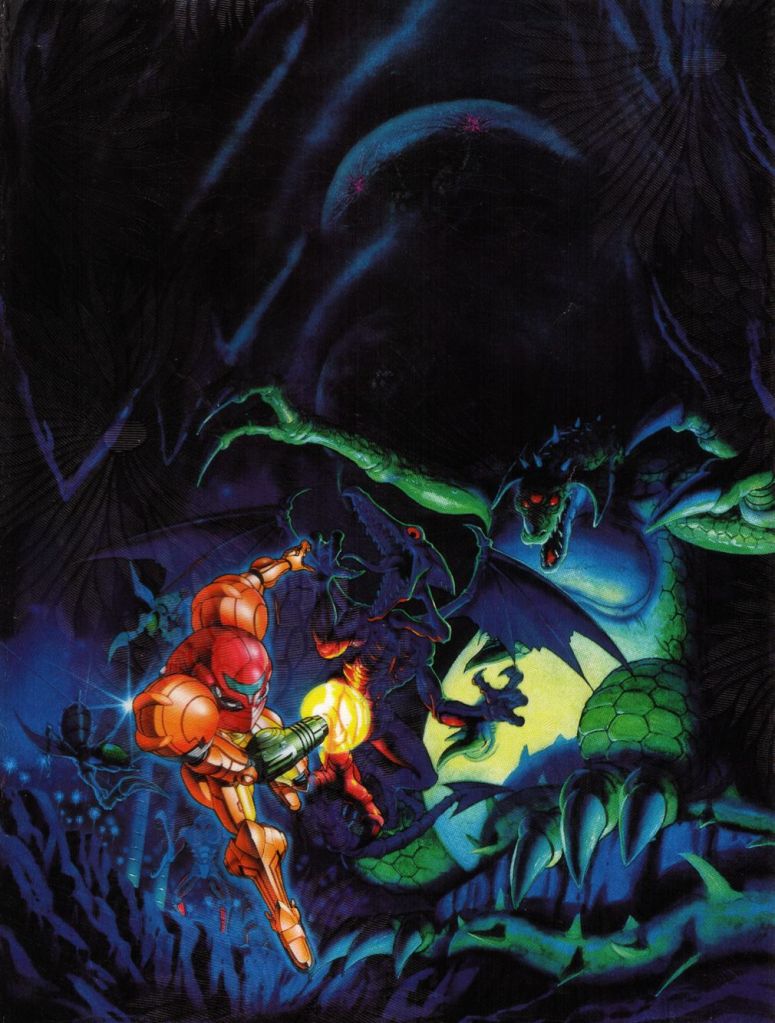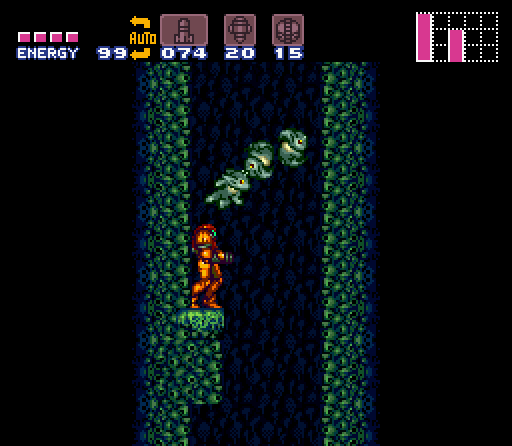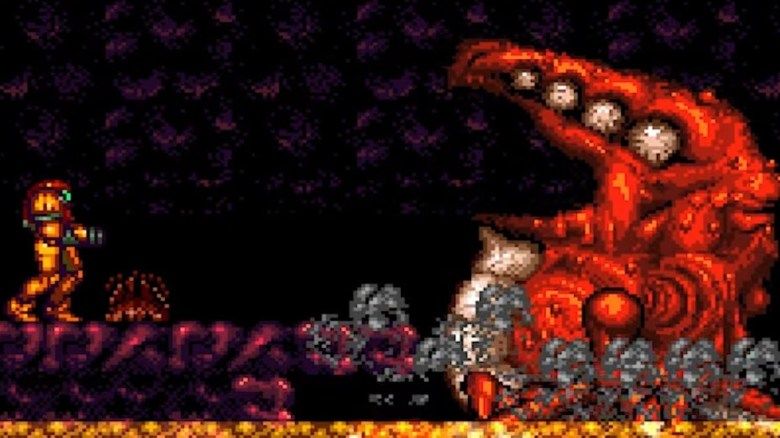
Genre: Metroidvania
Year: 1994
Developed by: Nintendo R&D1
Published by: Nintendo
Platforms: SNES
#120
Feeling Like: OverClocked
I’ve hit another invisible tier of quality on the Almighty Spreadsheet. Looking ahead, I’m both looking forward to writing about the upcoming games, but also flip flopping on their exact placement – everything 120 and on is good. Really good.
Super Metroid is one of the few games ever made to have a legitimate claim to the “best of all-time” crown. It’s almost solely responsible for the creation of the Speed Running Community (along with Doom), the level design is incredible and the atmosphere is peerless. It takes everything found in Metroid and improves it beyond what players thought possible. There’s a reason the Super Nintendo was so revered, titles like Super Metroid, Super Mario World and The Legend of Zelda: A Link to the Past are still considered to be among the best of their respective mega franchises.
I’ve gushed so far; surely I don’t think 119 games are better than Super Metroid?

Absolutely not. But this isn’t a ranking of the best games ever, it’s a ranking of Henry’s Experience with Specific Games …in which I then interpret into my own list of the best games ever. For Henry.
Anyway.
Super Metroid has the disadvantage of not being played much by 10 year old Henry, who would have been absolutely fascinated. While I wasn’t into horror necessarily, I was very much into Alien and Aliens. Or, at least, from what I saw between my fingers as I hid from the Xenomorphs I saw Dobbo play Super Metroid and I did eventually beat it in bits and pieces, but I never had that magical time where I ran through the game in one sitting, or read the guide in Nintendo Power, or rented it a dozen times from the store. I knew it was there on the shelf, but so was Chrono Trigger and Final Fantasy 6 and Super Mario World 2: Yoshi’s Island and there’s only so much time (tons) and money (none) that young Henry had.
So, that’s the reason Super Metroid is “only” at spot 120. It could be 100 spots higher and I wouldn’t blink an eye, but I finished it in my late 20s and by then the exquisite parts had been borrowed from many other titles and it didn’t have as much of a “wow” factor. That’s on me, not on the game.

Everything works in sync in Super Metroid, starting with the graphics. They received a major overhaul from Metroid. Samus feels more threatening and intimidating simply through her animations. She’s got shoulder pads like some kind of futuristic linebacker. Her visor looks badass. Her yellow armor is in stark contrast to the bleak, dark, alien world she’s landed on. One of her arms is a blaster. If the scenario involves a lone bounty hunter on a hostile planet, you better give the protagonist some teeth and there’s a reason Samus, despite very little character depth, has remained among the most recognizable and favored in the industry.
There aren’t many moments of peace. Corridors are dank, and dangerous. Upgrades aren’t presented to you on a platter. There aren’t giant arrows pointing you in the right direction. Your only aide is the map, although admittedly it is a dope-ass blueprint for finding your way around. No more using graph paper and pencils to scout out the labyrinthian world, although there was some charm to that.
The gameplay is as tight as anything – moving Samus, switching weapons, rolling into the morph ball, launching missiles and sprinting at ludicrous speeds all feel fantastic. Though, I will say, wall jumping took me WAY too long to figure out the timing for. There’s one aspect where future games have surpassed the master.

While the gargantuan boss fights are certainly a highlight, you can’t be the most atmospheric game ever without an incredible soundtrack, and by God did Kenji Yamamoto and Minako Hamano knock it out of Zebes. I cannot tell you how may times I’ve put the soundtrack on when I want to feel isolated, or creeped out. Or working on a particularly difficult project, like the 500, when I need to feel like I can do anything. It’s a superb set of songs that still resonate, nearly 30 years later.
Or how foreboding the intro is.
I can practically feel the rain on my back, and the thunder across my skin.
Unsurprisingly, this 2d classic has inspired multiple OCRemixes.
If they played more songs like Jade Catacombs, I’d go to more raves.
One Girl in the All the World and All the World in One Girl are natural companion pieces. If you ever feel like you need a boost, or want to believe you can run through a wall, give those two a listen.

I know the term ‘Metroidvania’ wasn’t around in 1994, since Castlevania: Symphony of the Night wouldn’t be released for another three years, but regardless of what online idiots like me use for a label, I absolutely love this type of adventure. I enjoy backtracking, I genuinely do. It’s not a pain to go back and re-discover a new area if it means taking advantage of a new type of missile or upgrade. Jumping higher, or twice, to reach a previously impossible platform fires every positive chemical in my brain. While it may be temporarily frustrating to hit a wall because you haven’t found the right bomb, knowing that there’s something out there that you WILL obtain to help you bypass it more than makes up for any consternation. Axiom Verge, both Ori games, and Metroid Prime are superlative examples of the genre, all of which owe their very existence to Super Metroid and Castlevania: Symphony of the Night.
Progression of power in these types of games is of the utmost improtance. Traversal is massively important as well. One of the greatest failures of Environmental Station Alpha was as the game went on, it became harder to maneuver from room to room. Scaling of difficulty is expected in video games, but I want appropriate upgrades to match the challenge at hand. I don’t want backtracking to feel like a chore because I cannot, for the life of me, figure out how to get back to that specific room. Or how a chamber I’ve waded through a dozen times all of a sudden becomes torturously slow because of a new sand hazard.
Super Metroid avoids all of that. The record for completing the game is 40 minutes, 36 seconds. You can’t get to that level of mastery unless the controls are air tight and the level design encourages shortcuts and creative paths to your goal. There is no frustrating part (unless you’re me, trying to wall jump), only ominous areas that heighten your senses through perfect game design.
Super Metroid deserves to be way higher on the 500. Consider this one of the most inaccurate placements on the entire list, but I will hold steadfast that due to sporadic sessions and mostly distant appreciation, #120 is where it belongs on my blog. Where it belongs in the video game zeitgeist is obvious.